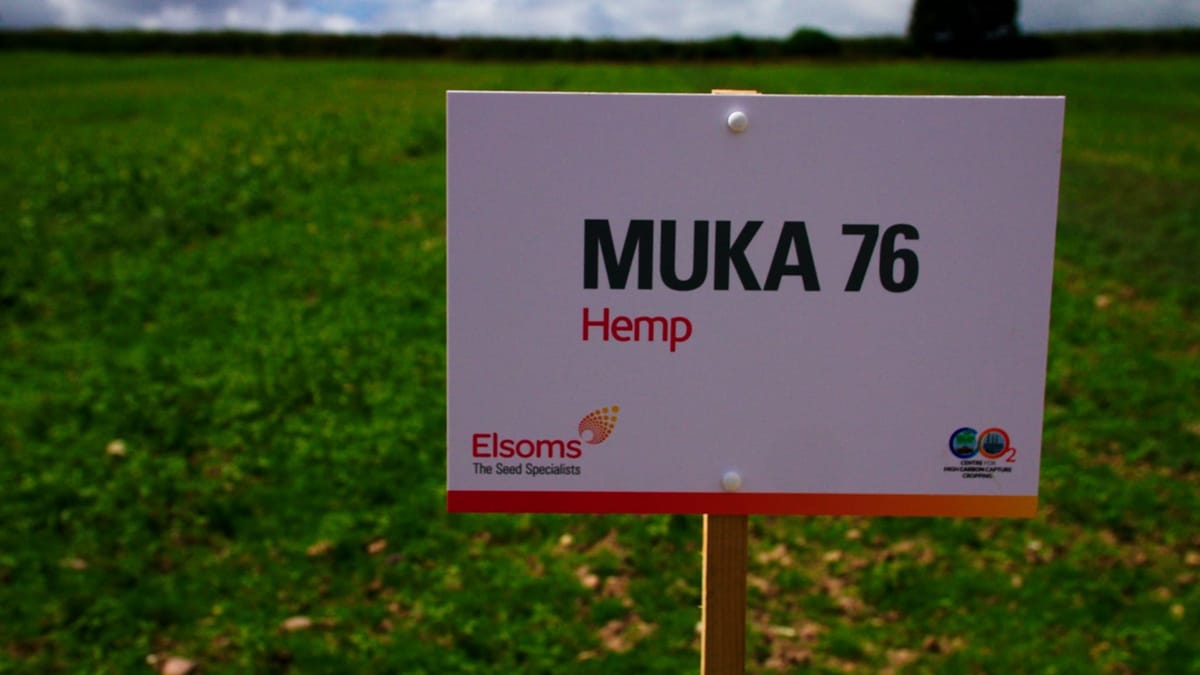Seed to Store - Biomaterial Futures

From Seed to Store: NIAB’s Groundbreaking Hemp and Flax Initiative
Imagine transforming an old, inefficient building into a modern, sustainable masterpiece using materials that are both environmentally friendly, sequestering carbon and cost-effective.
This is the future NIAB’s (National Institute of Agricultural Botany) Centre for High Carbon Capture Cropping envisions. With hemp and flax at the core, the refurbishment and retrofit industry is the future with these bio materials at it's fingertips.
Spearheaded by Lydia Smith, this pioneering initiative aims to transform hemp and flax into viable, sustainable products for the refurbishment and retrofit industry.
If you ask yourself, can I personally make a difference? The answer is yes,
"If you ask yourself, can I personally make a difference? The answer is yes," Smith says, inviting both farmers and retrofit professionals to join this transformative journey.
This years crop of hemp has been hampered by wet weather
Revolutionizing Agriculture
NIAB’s initiative is a bold response to the pressing need for sustainable materials. As Lydia Smith explains, the Centre for High Carbon Capture Cropping is a four-year project funded by Defra and facilitated by Innovate UK. "We are specifically looking to reduce emissions affecting climate change, particularly carbon dioxide and nitrous oxide," she says. By integrating carbon-capturing crops like hemp and flax into agricultural rotations, NIAB aims to create products that are as beneficial for the environment as they are for industry.
Collaboration at its Core
A fundamental aspect of this initiative is its collaborative nature. "There are 19 partners involved in this project," Smith notes, highlighting the extensive network of farmers, researchers, manufacturers, and retailers working together. This collaborative effort ensures that each stage of the process, from cultivation to final product development, is optimized for sustainability and efficiency.
Innovative Farming Techniques
NIAB’s approach to farming these crops is rooted in innovation. Precision farming techniques allow for real-time monitoring of crop health and soil conditions, enhancing both yield and sustainability. "We're looking at different crops that can capture a lot of carbon, either into the product, the soil, or their roots," Smith explains. This method not only improves productivity but also ensures that farming practices remain sustainable and environmentally friendly.
Dr Lydia Smith describes the project
Challenges and Solutions
Despite its promise, the journey from seed to store is not without challenges. Smith acknowledges the difficulties in processing hemp: "There are impediments in terms of taking it from the field to getting it to the product. That processing material is big and expensive and needs to be in place." Overcoming these barriers involves significant investment in infrastructure and technology, areas where NIAB and its partners are actively working.
Research and Development
Central to the project's success is rigorous research and development. Field trials help identify the best hemp and flax varieties for different environmental conditions, while advanced breeding techniques enhance properties like fibre strength and pest resistance. "We've registered several new varieties and are tracking them to understand which work best in the UK environment," says Smith. This meticulous R&D ensures that the final products meet the high standards required by the refurbishment and retrofit industry.
Elsom Seeds flax growing in British fields
Sustainability at Every Step
Sustainability is at the heart of NIAB’s initiative. From seed selection to the final product, every step is designed to minimize environmental impact. "Hemp grows incredibly well and quickly," Smith points out, emphasizing its role in sustainable farming. The use of natural fibers like hemp and flax reduces reliance on synthetic, non-renewable materials, while the entire supply chain is optimized to reduce waste and promote recycling.
Commercial Viability
While sustainability is a primary focus, commercial viability is equally important. Products developed under this initiative are not only eco-friendly but also cost-effective. By streamlining the supply chain and employing efficient manufacturing processes, NIAB ensures competitive pricing. "It's within our power to use these biobased products instead of petrochemical-based materials," Smith asserts, making a compelling case for their adoption in the industry.

Elsom Seeds: Partnering for Success
An integral partner in this venture is Elsom Seeds, where Heather Oldfield, the Business Development Manager, has been instrumental in advancing the project's goals. Elsom Seeds is focused on developing and providing the right seed varieties that can thrive in the UK environment. "We started looking at natural fibers for the business about four years ago," Oldfield explains. The collaboration with NIAB and other partners ensures that the best varieties of hemp and flax are identified and cultivated.
"We're looking at different varieties to see which varieties best suit different markets,"
Innovative Seed Solutions
Elsom Seeds’ work involves extensive trials to find the most suitable varieties for different markets. "We're looking at different varieties to see which varieties best suit different markets," says Oldfield. Their research has led to significant findings, particularly in adapting flax to the UK's climate, which historically grew more linseed. "Flax is seeing a resurgence because of the weather patterns that they have in Europe," she notes, highlighting the changing dynamics of crop cultivation due to climate change.
Market Integration
Oldfield emphasizes the natural synergy between hemp and flax, especially for products like insulation. "The two products seem to go naturally together, particularly in terms of insulation," she explains. This compatibility makes them ideal for integration into various sustainable building materials, offering a robust solution to the industry’s needs.
"You can have the equivalent of half a tonne of embodied carbon in your loft rather than using glass fibre"
Market Potential
The potential market for hemp and flax-based products is substantial. As awareness of environmental issues grows, so does the demand for sustainable building materials. NIAB’s initiative is perfectly positioned to meet this demand, offering innovative and eco-friendly products. "You can have the equivalent of half a tonne of embodied carbon in your loft rather than using glass fibre," Smith notes, illustrating the tangible benefits of these materials.
It's Already In The Market
NIAB’s Centre for High Carbon Capture Cropping is a testament to what can be achieved through innovation, collaboration, and a steadfast commitment to sustainability. We know that innovating companies like Indinature, Unyte Group and Hempcrete are leading the charge but with more varieties available, a UK based crop is surely the best source for retrofit manufacturers?
We'll be tracking this years crop of hemp (and flax) from 'seed to store' so stay tuned for more insight into crops that could be one of the bright stars of our retrofit future.
